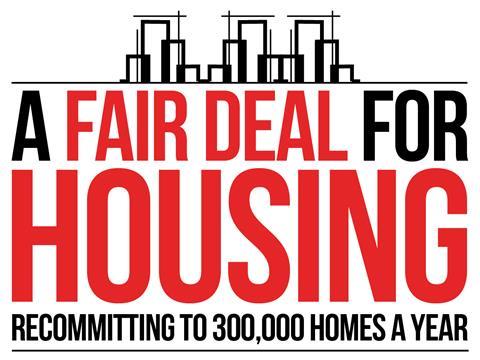Levelling Up, Housing and Communities Committee calls for ministers to set and publish target for social rented homes
MPs have called on the government to ‘support, regulate and invest in” the social housing sector in order to increase delivery to 90,000 social rented homes a year.

The cross-party Levelling Up, Housing and Communities committee has today published its findings into the finances and sustainability of the social housing sector.
It found that competing financial pressures are causing social housing providers to cut the amount they are spending on building new homes.
The report points to figures showing local authority waiting lists rose 2% to 1.21m in 2021/22. Official figures show just 9,561 homes for social rent - as opposed to other social housing tenures such as affordable rents and shared ownership - were built in 2022/23.
The committee said that the government’s current use of grant to fund homes for affordable rent – which are set higher than social rents at up to 80% of market rates – and shared ownership “is inefficient” as these homes can be financially viable without direct grant.
It said: “We recommend that the government should conduct an early assessment of the adequacy of grant funding allocations and how much social rent is to be supported.
“The government should also assess the role of appropriate private investment providing affordable rent or other forms of tenure in order to free up grant funding to better support more social housing provision.
“As a first step the government should set and publish a target for the number of social rent homes it intends to build each year.”
It says the government should set clear targets for net additions of social rent, affordable rent and shared ownership to provide “a clear direction for the social housing sector.”
The MPs warn that the social housing sector is facing increased operational costs, such as higher inflation than the economy as a whole, increased borrowing costs and costs related to energy prices, insurance for building safety issues and legacy Covid-19 costs in the form of delayed maintenance.
The report notes that the social housing sector is also being required to make costly enhancements to its properties to meet decarbonisation goals, fire safety measures, and the decent homes standard.
>>See also: Housing Today calls for affordable housing funding review and planning overhaul
>>See also: ‘The figures on starts are terrifying’. What’s really happening to the Affordable Homes Programme
It added that the sector is still feeling the impact of the government’s decision to cut annual rents by 1% between 2015 and 2020, instead of being permitted to rise rents by Consumer Price Index measure of inflation plus 1% as expected. The sector also faced a 7% rent cap last year as part of the government’s response to the cost of living crisis.
It said: “The impact of this is still being felt today as the reductions lower the starting base for all future percentage increases, meaning that future rents are lower than they would have been.”
The report recommends ministers bring in a rent settlement of at least five years tied to inflation, and to publish a list of the kind of events that might lead to a rent cap being reintroduced.
Other key recommendations for government bodies include:
- The government and local authorities should more actively use planning powers to ensure that the price of land does not inhibit the development of new social homes. Land value capture should be part of the process for funding new social housing, especially for new towns and large sites.
- Bring forward the next tranches of the Social Housing Decarbonisation Fund urgently
- Review the role private investment might play in meeting net zero and set out longer term funding plans beyond 2025
- Give greater weight to the benefits of regeneration so more funding can be available for replacing homes.
- Give social landlord the same assess to building safety remediation funds as private landlords
- The Regulator of Social Housing (RSH) should proactively assess how registered providers use their reserves not only as an indication of financial viability, but also as an indication of providers’ governance, value for money and responsiveness to tenants. Providers should involve tenants in discussions about rent levels.
- Where registered housing providers have homes that require major improvements and significant reserves, the RSH should encourage them to deploy their reserves to remediate and regenerate their existing properties, or to replace them with new ones if necessary.
- The RSH should regularly review its own ability to scrutinise new financing models in the social housing sector in addition to examining registered providers boards and executives
Responding to the report, a DLUHC spokesperson said: ”“Our Long-Term Plan for Housing will support the delivery of more homes, including additional social housing.
”Since 2010 we have delivered over 696,100 new affordable homes, of which 172,600 are for social rent, and we are on track to deliver on our target for new social homes.
Sector reaction
Clare Miller, chief executive of Clarion Housing Group, said: “I am encouraged to see committee reaffirm the urgent need for government investment to allow us to build at scale. This can’t come soon enough.
“Clarion has built nearly 10,000 homes over the last five years and the vast majority of these have been for affordable tenures, but the old financial model is no longer working.
”Inflation his hit our sector hard. The cost of construction is up and the supply chain yet to recover fully from the pandemic and the mini Budget of 2022.
James Prestwich, director of policy and external affairs at the Chartered Institute of Housing (CIH) said: ”For some time now the social housing sector has been calling on the government to acknowledge the financial pressures it is facing and to invest more effectively in supply and maintenance.
”Today’s report from the LUHC committee helpfully brings together evidence from a range of organisations and individuals, highlighting the partnership role that government must play in supporting the urgent supply of more social housing as well as its maintenance and future-proofing.”
Darren Rodwell, housing spokesperson, Local Government Association (LGA), said: “There are currently not enough affordable homes to meet demand, with more than 1.2 million households on council waiting lists in England and over 100,000 households living in temporary accommodation – this is a record high.
“The LGA has set out a six-point plan to spark a council house building renaissance, which must include urgent reform to the Right to Buy. “Long-term certainty on powers and funding could help councils deliver an ambitious build programme of 100,000 high-quality, climate-friendly social homes a year.”
“We are driving up standards in social housing with funding for providers to improve homes and through Awaab’s Law, which will help to ensure homes across the country are safe, decent and warm by making social landlords act to fix health hazards within a strict timeframe.”
A Fair Deal for Housing
The committee’s report echoes some of the thinking behind the findings of Housing Today’s A Fair Deal for Housing campaign findings published earlier this year.

Housing Today calls on the next government to consider reviewing existing funding for affordable housing so that a more ambitious programme of 100,000 affordable homes a year can be delivered.
The report also suggests the review could look at grant rates for affordable housing, a longer-term rent settlement for social housing providers, a time-limited stimulus package to counteract the high cost of private funding and at mechanisms to lever in more institutional finance for ‘for-profit’ registered providers.










No comments yet